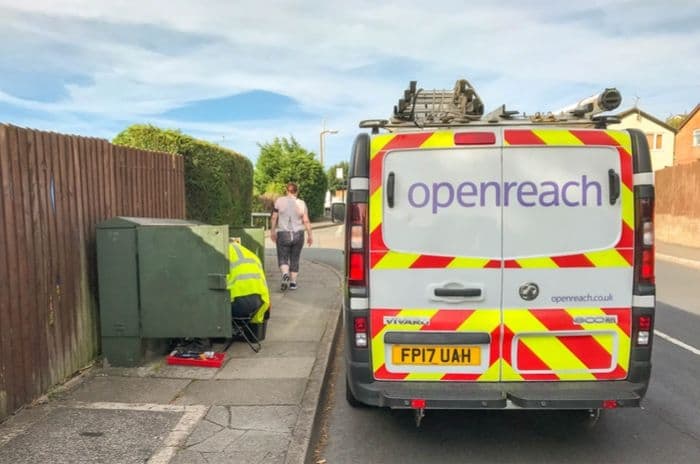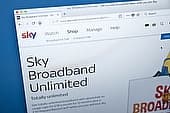Home > Broadband > News > Broadband providers fight over Openreach
Broadband providers fight over Openreach
BT have made it clear they won't let go of Openreach without a fight, ahead of an industry wide review by Ofcom.

Sky, Talktalk and Vodafone have all called for Openreach to be split completely from BT, saying the current setup is a "conflict of interest".
Openreach infrastructure is the most extensive of the fibre broadband networks and they all want better access to it, claiming this will increase incentives to invest and then improve competition.
But while BT's the easy target at the moment, having also invested heavily in their network and with plans to keep on expanding, Virgin Media have seen the writing on the wall.
They're teaming up with BT to hit back at the other three, complaining free access to physical networks could cause regulatory issues and put off future investment in infrastructure.
'Dark fibre' access
Ofcom regulations ensure other broadband providers can use the Openreach fibre network.
Openreach sell local loop unbundling and wholesale line rental at wholesale prices to other providers who then sell on broadband connections to their customers.
Sky, Talktalk and Vodafone all pay BT to use Openreach, but Virgin Media operates it's own network.
Now Sky, Talktalk and Vodafone want access to BT's 'dark fibre', that's the unused fibre-optic cables BT's laid for future expansion.
Frustrated by increasing faults and slow repairs, they also want better access to Openreach cable ducts and poles.
Not fit for purpose?
The battle to access this infrastructure has raged for years, interestingly Virgin Media used to fight for the other side.
But Virgin Media was never keen to share it's own infrastructure either; BT have even tried and failed to get Ofcom to force them to open up access to their ducts.
That's all water under the bridge now, with Ofcom announcing a digital communications review this month they've clearly realised they're better off joining forces.
Importantly for BT and Virgin Media, Ofcom are taking a close look at whether their regulation of the broadband market is doing enough to encourage competition.
Ofcom are also eager to provide incentive for further investment and "ensure widespread availability and high quality of service".
According to those providers buying wholesale from Openreach, regulation hasn't gone far enough and BT's control of so much infrastructure gives them free reign to dominate the market.
Jeremy Darroch, Sky Group Chief Executive insists a separation of Openreach from the rest of BT will provide, "capacity and incentive to invest whilst also harnessing the power of multiple competing retailers to drive higher take up and lower prices for customers".
And TalkTalk Chief Executive, Dido Harding says, "whilst the last ten years have seen a lowering of prices and increased take-up, it is increasingly clear that the current market structure is not fit for purpose".
Openreach working
BT are certainly benefiting financially from Openreach; it was responsible for 28% of their revenue in 2013/2014.
And that's despite losing £150 to £200 million due to tighter regulations so it's no wonder then they're fighting to keep it.
However they say losing control of Openreach could be bad news for customers too.
The theory being it's hard enough to maintain such an extensive network with one company running it, so letting in others could lead to more outages.
At the moment, any problems with Openreach infrastructure are really the responsibility of BT.
But if multiple suppliers were to start accessing that same infrastructure, there could be a question mark over who's responsible for fixing issues.
And arguably the current system is working, with BT customers no more satisfied with their service than Talktalk or Sky customers in 2014 according to Ofcom.
Margin squeeze
But Talktalk clearly believe BT are stifling their profits; they made a formal complaint to Ofcom about BT's superfast broadband pricing in 2013, accusing them of a margin squeeze.
Talktalk claimed BT were "abusing a dominant position" and they weren't able to compete effectively with the difference between BT wholesale and retail broadband prices too small.
In October 2014 Ofcom decided BT weren't at fault because overall they were making a reasonable profit - indicating they weren't then performing any kind of margin squeeze on broadband services.
Despite this decision though, Ofcom this month introduced new regulation on BT's pricing.
Ofcom now say they're "concerned BT could distort the development of competition in superfast broadband" if their margins between wholesale and retail prices are too small.
They'll continue collecting evidence for their digital communications review until summer 2015, with a report due around the end of the year.
Receive consumer updates that matter in our newsletter

We are independent of all of the products and services we compare.

We order our comparison tables by price or feature and never by referral revenue.

We donate at least 5% of our profits to charity, and we aim to be climate positive.
Latest News

8 February 2026
TV licence to rise to £180 from April 2026
5 February 2026
Sky confirms April 2026 price rises for broadband and TVReceive consumer updates that matter in our newsletter



